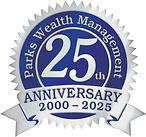Important Birthdays Over 50
- Jim Parks, CFP, AIF

- Jun 1, 2020
- 2 min read
Most children stop being “and-a-half” somewhere around age 12. Kids add “and-a-half“ to make sure everyone knows they’re closer to the next age than the last.
When you are older, “and-a-half” birthdays start making a comeback. In fact, starting at age 50, several birthdays and “half-birthdays” are critical to understand because they have implications regarding your retirement income.
Important Birthdays:
Age 50
At age 50, workers in certain qualified retirement plans are able to begin making annual catch-up contributions in addition to their normal contributions. Those who participate in 401(k), 403(b), and 457 plans can contribute an additional $6,500 per year in 2020. Those who participate in Simple IRA or Simple 401(k) plans can make a catch-up contribution of up to $3,000 in 2020. And those who participate in traditional IRAs can set aside an additional $1,000 a year.
Age 59½
At age 59½, workers are able to start making withdrawals from qualified retirement plans without incurring a 10% federal income-tax penalty. This applies to workers who have contributed to IRAs and employer-sponsored plans, such as 401(k) and 403(b) plans (457 plans are never subject to the 10% penalty). Keep in mind that distributions from traditional IRAs, 401(k) plans, and other employer-sponsored retirement plans are taxed as ordinary income. There are specific rules under the CARES Act in which the 10% early withdrawal penalty is waived if you’ve been impacted by COVID-19.
Age 62
At age 62 workers are first able to draw Social Security retirement benefits. However, if a person continues to work, those benefits will be reduced. The Social Security Administration will deduct $1 in benefits for each $2 an individual earns above an annual limit. In 2020, the income limit is $18,240.
Age 65
At age 65, individuals can qualify for Medicare. The Social Security Administration recommends applying three months before reaching age 65. It’s important to note that if you are already receiving Social Security benefits, you will automatically be enrolled in Medicare Part A (hospitalization) and Part B (medical insurance) without an additional application.
Age 65 to 67
Between ages 65 and 67, individuals become eligible to receive 100% of their Social Security benefit. The age varies, depending on birth year. Individuals born in 1955, for example, become eligible to receive 100% of their benefits when they reach age 66 years and 2 months. Those born in 1960 or later need to reach age 67 before they’ll become eligible to receive full benefits.
Age 72
Under the SECURE Act, in most circumstances, once you reach age 72, you must begin taking required minimum distributions from a Traditional Individual Retirement Account (IRA) and other defined contribution plans. You may continue to contribute to a Traditional IRA past age 70½ under the SECURE Act as long as you meet the earned-income requirement. Due to the CARES Act, required minimum distributions are waived for 2020.
Understanding key birthdays may help you better prepare for certain retirement income and benefits. But perhaps more importantly, knowing key birthdays can help you avoid penalties that may be imposed if you miss the date.





Comments